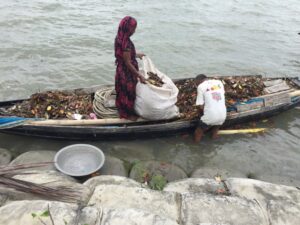Methodology
 FeStay project employs an inductive research approach, as no available dataset can attain the research objectives. FeStay employs a life-story approach. In particular, five different environmental hazard-prone communities (e.g. cyclones, floods, river-bank erosion, and landslides) in Bangladesh were selected. Life-story interviews with at least five households from each community was conducted, with each household representing at least three generations (grandparent-parent-children). Female participants have been purposively selected to represent both migrants and non-migrants, household capabilities, and varying scales of environmental risks. Each interview consists of the life-long experiences of adapting to environmental hazards, how knowledge and experiences are shared across generations, and how such knowledge transfer improves the adaptive capacity of the households.
FeStay project employs an inductive research approach, as no available dataset can attain the research objectives. FeStay employs a life-story approach. In particular, five different environmental hazard-prone communities (e.g. cyclones, floods, river-bank erosion, and landslides) in Bangladesh were selected. Life-story interviews with at least five households from each community was conducted, with each household representing at least three generations (grandparent-parent-children). Female participants have been purposively selected to represent both migrants and non-migrants, household capabilities, and varying scales of environmental risks. Each interview consists of the life-long experiences of adapting to environmental hazards, how knowledge and experiences are shared across generations, and how such knowledge transfer improves the adaptive capacity of the households.
A total of 70 individual life stories have been collected and transcribed. After this, they will be coded and analyzed.
Field sites
Our research team has collected data in five main field sites in Bangladesh: Satkhira, Khulna, Chittagong, Iswardi, and Jamalpur.
Satkhira
Khulna
Chittagong
Iswardi
Jamalpur

